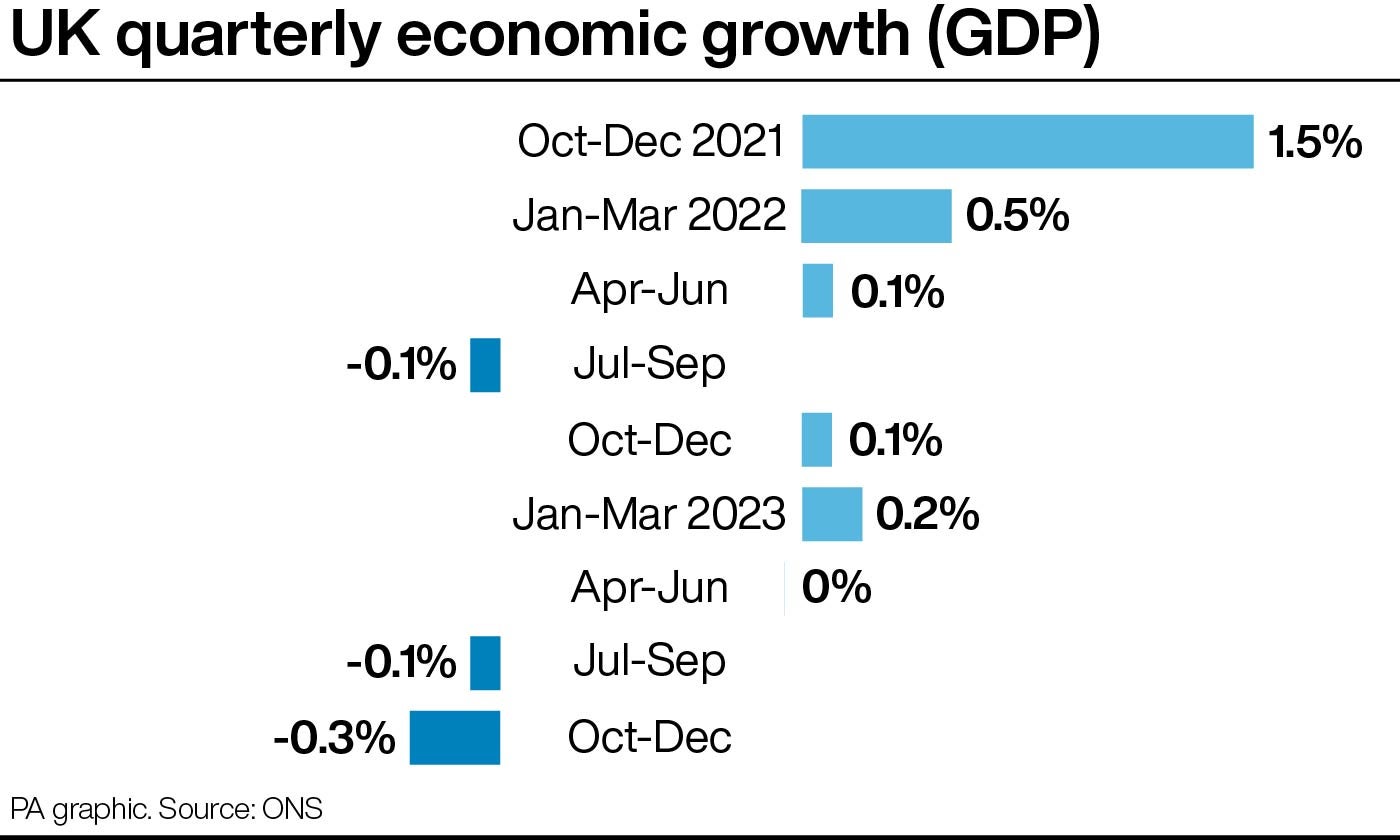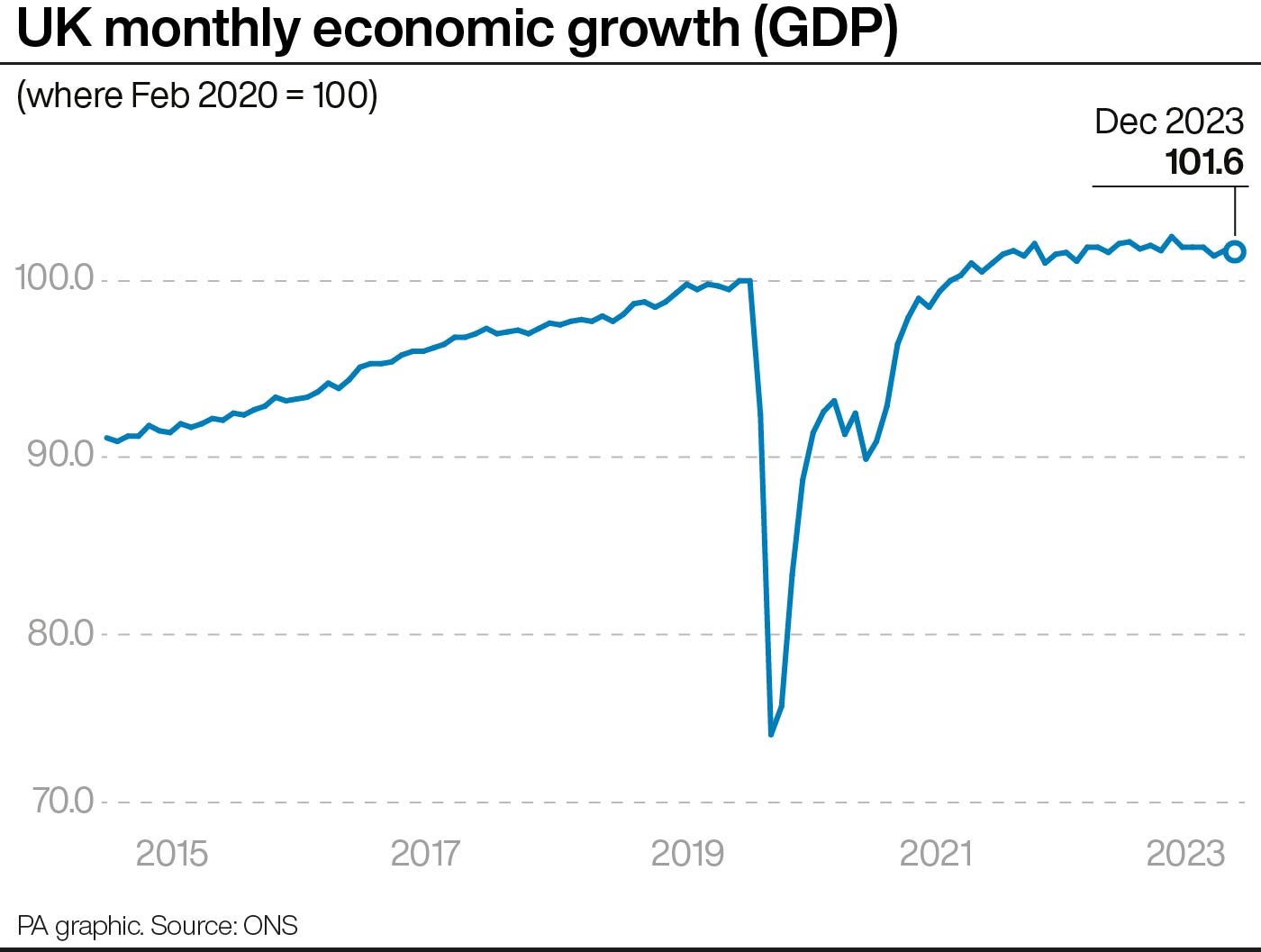What being in recession means and how it happened to the UK
The fourth quarter contraction was the biggest since the first three months of 2021, at the height of the pandemic
Your support helps us to tell the story
From reproductive rights to climate change to Big Tech, The Independent is on the ground when the story is developing. Whether it's investigating the financials of Elon Musk's pro-Trump PAC or producing our latest documentary, 'The A Word', which shines a light on the American women fighting for reproductive rights, we know how important it is to parse out the facts from the messaging.
At such a critical moment in US history, we need reporters on the ground. Your donation allows us to keep sending journalists to speak to both sides of the story.
The Independent is trusted by Americans across the entire political spectrum. And unlike many other quality news outlets, we choose not to lock Americans out of our reporting and analysis with paywalls. We believe quality journalism should be available to everyone, paid for by those who can afford it.
Your support makes all the difference.Prime Minister Rishi Sunak’s pledge to grow the economy has been dealt a hammer blow after official figures revealed Britain fell into recession at the end of last year.
The Office for National Statistics (ONS) estimated that gross domestic product (GDP) fell by a worse-than-expected 0.3% between October and December, following a decline of 0.1% in the previous three months.
It means that the economy entered a technical recession, as defined by two or more quarters in a row of falling GDP.
When was the UK last in recession?
It marks the first time the UK has entered recession since the first half of 2020, when the initial Covid-19 lockdown sent the economy plunging into reverse.
Economists said the recession is likely to be short-lived, with GDP expected to pick up from the start of 2024.
But the figures are damning for Mr Sunak, who has vowed to grow the economy as one of his five priorities.
Shadow chancellor Rachel Reeves said his economic pledge has been left “in tatters”.
She said: “The Prime Minister can no longer credibly claim that his plan is working or that he has turned the corner on more than 14 years of economic decline under the Conservatives that has left Britain worse off.
“This is Rishi Sunak’s recession and the news will be deeply worrying for families and business across Britain.”
Chancellor Jeremy Hunt said the contraction comes off the back of high inflation and the recent run of interest rate rises, but insisted the economy was turning a corner.
He said it was the “right thing to do” to prioritise tackling inflation.

The Chancellor told broadcasters: “We always expected growth to be weaker while we prioritised tackling inflation, that means higher interest rates, and that is the right thing to do because you can’t have long-term healthy growth with high inflation.
“The underlying picture here is an economy that is more resilient than most people predicted, inflation is coming down, real wages have been going up now for six months.
“If we stick to our guns, independent forecasters say that by the early summer we could start to see interest rates falling and that will be a very important relief for families with mortgages.”
Why are we in recession?
The fourth quarter contraction was the biggest since the first three months of 2021, at the height of the pandemic.
Most economists were forecasting a 0.1% decline in GDP between October and December.
The ONS said output fell 0.1% in December after downwardly-revised growth of 0.2% in November, while the contraction in October was also worse than first thought, at 0.5% against the 0.3% fall initially estimated.

Across the year as a whole, the economy grew, but by an anaemic 0.1%, down from 4.6% growth in 2022 and – when stripping out the pandemic-hit plunge seen in 2020 – the weakest expansion since the aftermath of the financial crisis in 2009.
The ONS said the contraction was broad-based across the economy in the fourth quarter.
Liz McKeown, ONS director of economic statistics, said: “All the main sectors fell on the quarter, with manufacturing, construction and wholesale being the biggest drags on growth.”
Retail and wholesale trade were the biggest pull on output in December, while health and education sectors also both contracting, according to the ONS.

Barret Kupelian, chief economist at PwC UK, said while the UK is in a technical recession, it would likely not be long-lasting or deep.
He said: “We expect this episode to be one of the shallowest recessions of modern times, as it does not reflect a sharp and protracted downturn in response to a specific set of adverse economic circumstances.
“Business activity picked up significantly in the beginning of the year, which should translate to better real economic data.”
But a technical recession is seen reinforcing the case for an interest rate cut, with the Bank of England already indicating it is more a case of when, not if, a reduction will come.
What is a recession?
There is no real definition. It is seen as a time when the economy is declining, but there is no globally standardised way of saying exactly how much decline and exactly how long the period has to be.
In the UK, the most generally accepted definition of a recession is two quarters in a row when gross domestic product (GDP) falls.
But that means even if GDP drops by 0.01% one quarter and 0.01% again the next we are technically in a recession.
That would be a very shallow recession and much less painful than if GDP shrunk by 3% one quarter and rose by 1% the next – which would not be a recession.
Other countries measure recessions in different ways, taking into account the size of the drop or other factors.

Join our commenting forum
Join thought-provoking conversations, follow other Independent readers and see their replies
Comments